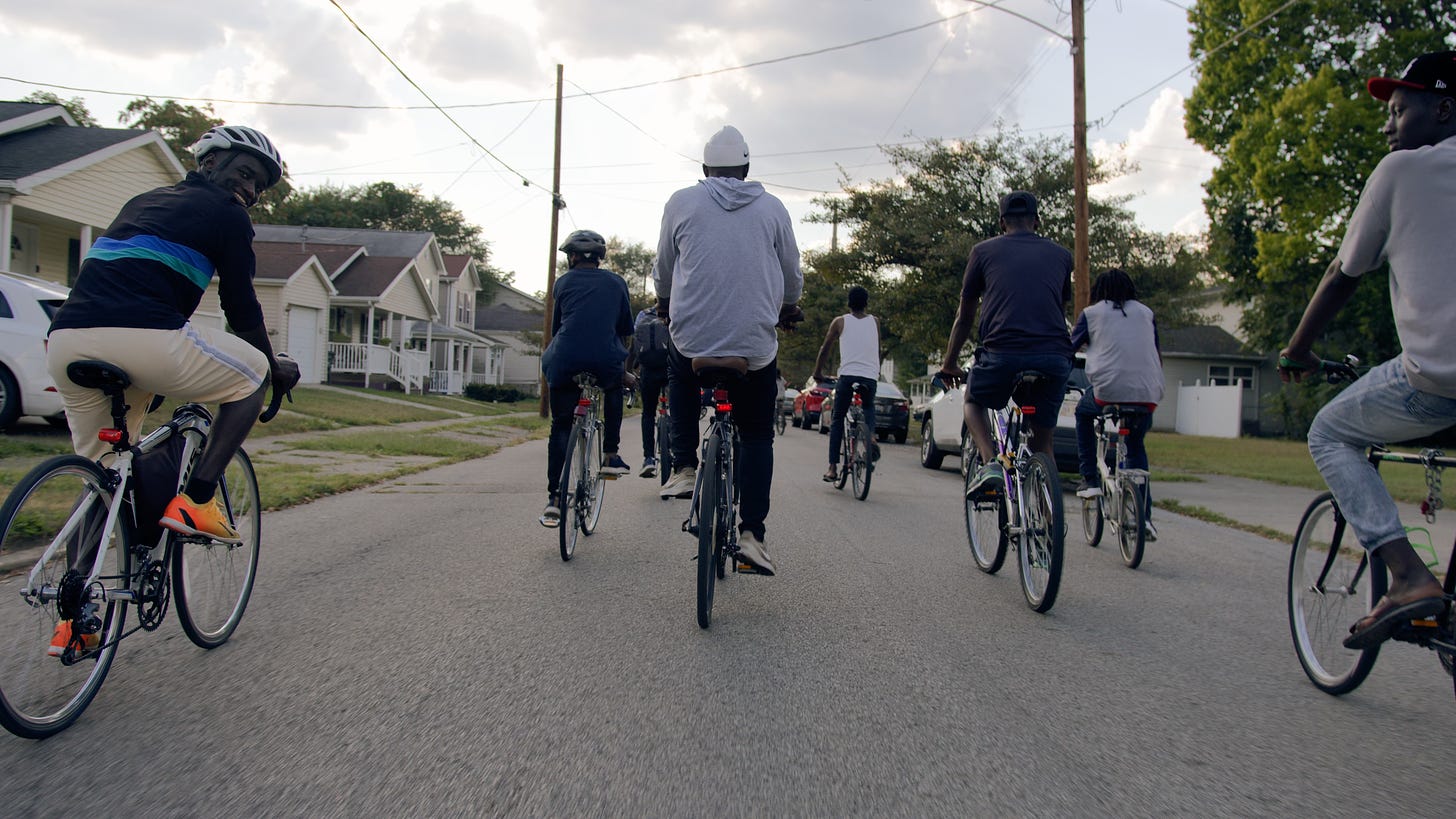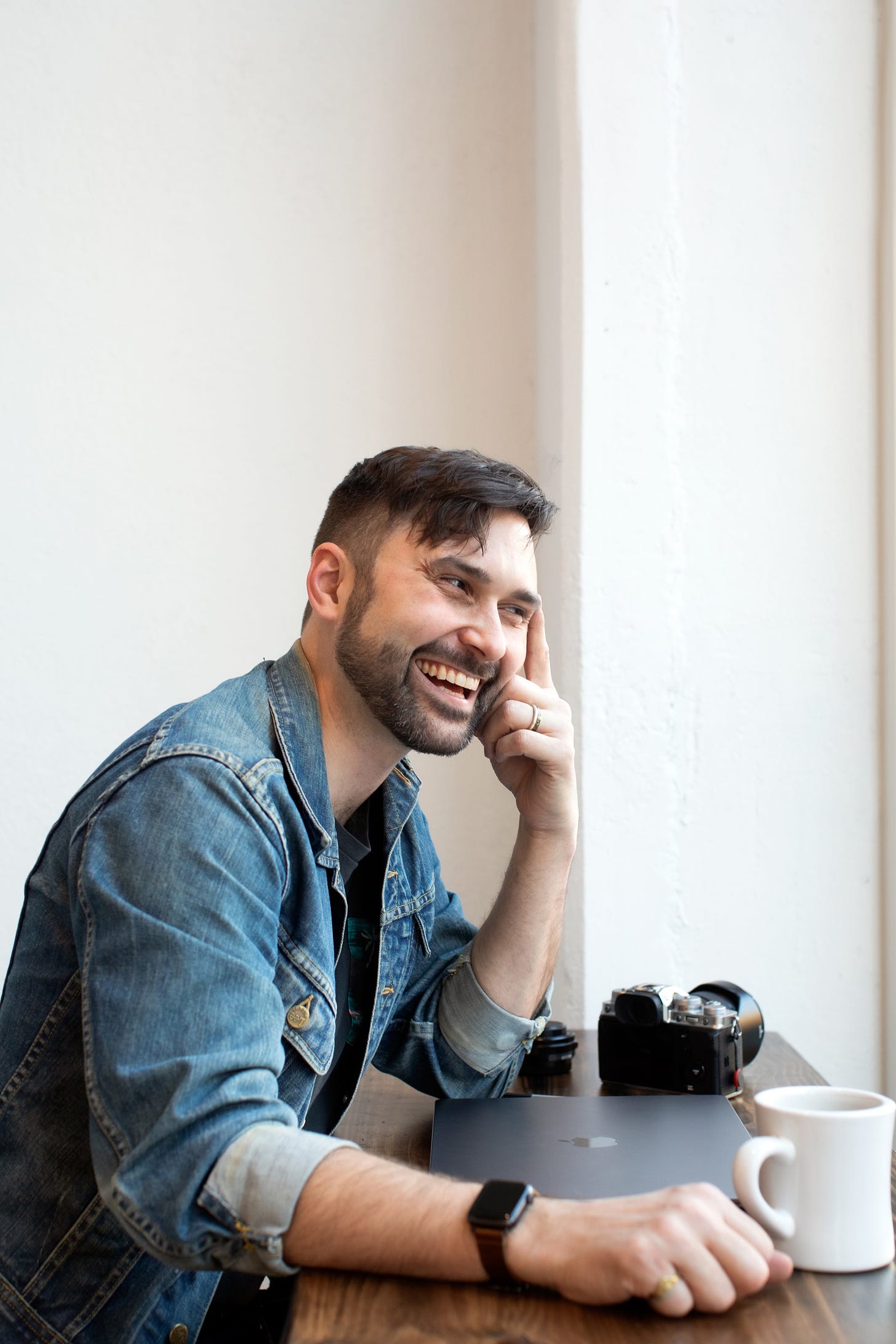I’ve got a 10-minute documentary film I’m hoping you’ll make time to watch.
I’m excited to share this story with you, which is familiar to me, about thousands of Mauritanian asylum seekers arriving in Cincinnati. Although recent reporting has skewed toward viewing these newcomers negatively, in my experience of working as an ESOL teacher with these men, I have found them warm and courteous, funny and conscientious.
Some politicians today will insist you can only care about Americans or immigrants, long-time residents or newcomers. I reject this. I’m far more optimistic about compassion as a renewable human resource, and I hope this video allows you another perspective on an immigrant story. And whatever your perspective on politics (or religion, for that matter), I hope it reminds you that compassion requires active engagement.
This documentary film, featuring the bike workshop ministry launched by Vincent Wilson, was made by Kemp Lyons, Executive Producer and Creative Director at Emberscout. Kemp and I ran into each other outside of church a couple of weeks ago, and it dawned on me that I could share his work (and this story) with you!
Without further ado, here’s our interview.
Kemp, tell us how you got connected with this story!
That might be the least interesting part! For years, my church has wanted to tell stories of our people serving the city. When a pastor introduced me to Vincent, it was an easy win for congregational storytelling. But I also saw so many other story seeds in what he was doing. It felt like it needed to be more than a congregational story.
How do you tell this kind of story well? What are the particular considerations and cautions you’re mindful of?
Honestly, this film is a bit of a land mine of potential issues, so I did my best to think through the implications of each… And I acknowledge that there may yet be real critiques - so I’m open to that.
The biggest challenge was why center a white guy as a protagonist? The first cuts of the film definitely felt a touch “white savior-y.”
But I kept Vincent prominent for a couple reasons:
I wanted to communicate with an audience that might not immediately hold sympathy for the immigrant story. Starting with a white bike dude might ease their entry to the story.
If there’s a reaction to the film, it’s easier for him and me to take the flak than the Mauritanian men. By leaving out their full stories and details, I’m hoping that they receive no reprisals or ill treatment from their participation in the doc.
Even though he’s the protagonist of this film, I could still make sure to feature the other guys’ stories. I’d wanted a whole secondary character, but that ended up not quite working out.
And, practically speaking, they’re not the easiest to communicate with! Without more time and funding, I think it’d be tough to build the relationships needed to tell their stories well.
What’s the larger story here, beyond this community of asylum seekers and this bike ministry?
There’s a ton more story to tell - about our broken immigration system, about the particular persecution these men are fleeing and the families they left behind, about the role of bicycles in a more climate-just world, and the power and importance of mobility.
But the larger context changed as soon as Donald Trump spread lies about Springfield, Ohio. That changed the timeliness - and maybe even purpose - of the film.
When I started this doc, I just loved Vincent’s passion and the idea that he’s giving these men a more abundant gift than it might seem at first.
But now I do view it was a bit of a counter-narrative to what the Republican ticket has been campaigning on. There are people within these communities that embrace the immigrant. That do their best to love these asylum seekers. They see the beauty they bring to our country.
If I were to continue, though, I think I’d have to acknowledge the difficulties that sudden influx brings to a community. The Mayor of Lockland has been responding to news media with some difficult - and maybe true! - sentiments. I think that’s a story worth telling, too. How do we hold two things true: that we should love the immigrant - and that it can be logistically very difficult to do that?
“Would Jesus give the Fulani bikes?” Does this question come from you at the end of the film? What motivates it?
I think the audience would walk into this film with a few assumptions. Like “food, water, and shelter are the most important things to give people.” Many Christians might start with the assumption that the gospel is the first thing they need.
But Vincent gave them bikes. Bikes that they use, by the way, to head to mosque! That’s not a common outcome of Christians giving back to their community.
In the end, I wanted to hear his thoughts addressing those assumptions. And he answered in his characteristically thoughtful and Jesus-loving way.
The congregational edit has a lot more of the “spiritual side” of the story and how Vincent’s own convictions shifted a bit during this experience. I’m hoping to finish that version in the coming weeks, too.
What excites you about having this film viewed and shared?
I think our job as storytellers is to reflect and refract culture. So I get excited about any opportunity to reflect back a lived reality to audiences that may not be familiar. And, like a beam of light gets shifted through a lens, I hope viewers walk away just a little changed. Maybe with a broader worldview.
About immigrants, certainly. To see at least one specific story of how migrants can be welcomed and loved might help warm someone’s heart who has never personally interacted with that story.
But also about bikes, mobility, and the role of dignity in philanthropy. Vincent doesn’t give away bikes. He gives migrants a sense of agency and self-determination that their situation otherwise denies them.
I think more “giving” should look like that.
For more than 15 years, Kemp Lyons has been writing, producing, and directing films across genre and purpose. But his real passion is discovering and telling meaningful stories and helping others do the same. From short-form commercials on social media to feature films for festivals and public broadcast, he has the experience and insight that can make any film project better. Kemp aspires to build a body of work that inspires people to connect more deeply with each other.
Kemp and his family live in Cincinnati. When not making films, he plays board games, makes cocktails for friends, and chases children all over his house.






I'm so glad you shared the documentary and interviewed Kemp, Jen. Thankful to call Vincent and Kemp brothers and co-laborers here in Cincinnati.
They are cracking me up with their jokes about Corollas and Lamborghinis. There’s something really refreshing about the small scale nature and practicality of fixing and giving bikes in a Christian culture that often feels like we have to be getting faith results for something to be worth doing. To know each other as fellow humans beyond our categories is a precious thing. It’s a beautiful film. Thanks for highlighting.